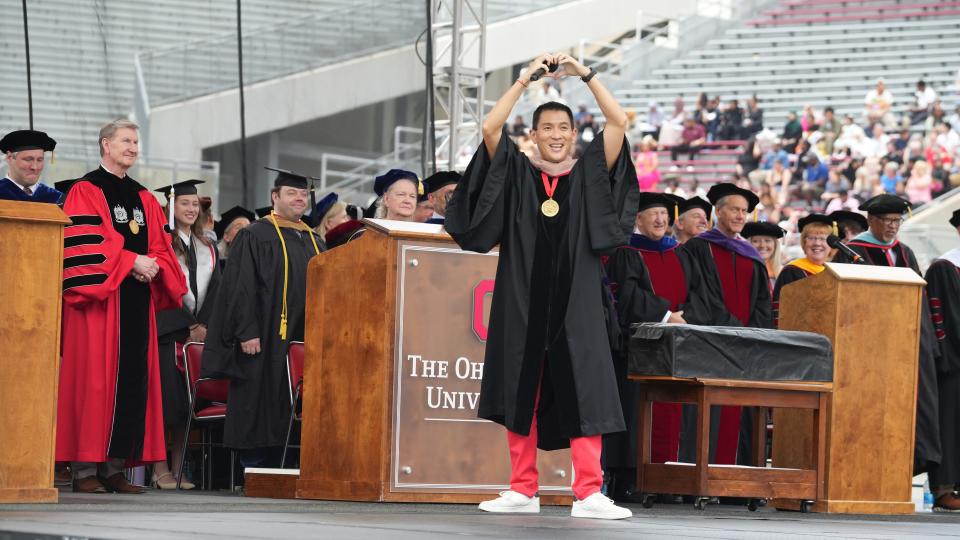After Harrison Butker, Ohio State graduation debacles, are we learning any lessons?
- Oops!Something went wrong.Please try again later.
There are more than a few lessons to learn from the recent commencement address fiascos.
I will focus on two.
First, some universities clearly need to do a much, much, much better job at vetting the person designated to inspire its newest alumni. Second, misinformation grows more corrosive every day, and more must be done to curtail it online.
Ohio State University felt that first lesson.
Few people expect to be taken on an ayahuasca trip after spending upwards of $50,000 for a degree, as was the case with social entrepreneur Chris Pan's Ohio State graduation speech.
I am confident that Benedictine College's female grads felt a certain way about Kansas City Chiefs' Harrison Butker's near assertion that they should put those degrees away, take their shoes off, pop out a litter of babies and head to the kitchen to cook their man a well-done steak with a side of cheesy mashed potatoes.
Butker replaced Pan as 2024's worst commencement speaker

In a sense, Butker's speech was a win for OSU. The Handmaid's Tale-ish commencement address made Pan sound like Maya Angelou in comparison.
Its divisive nature was not missed on the college's famous nuns.
"One of our concerns was the assertion that being a homemaker is the highest calling for a woman. We sisters have dedicated our lives to God and God’s people, including the many women whom we have taught and influenced during the past 160 years," the nuns said in a statement. "These women have made a tremendous difference in the world in their roles as wives and mothers and through their God-given gifts in leadership, scholarship and their careers. "
But denigration is what female, LGBTQ+ and Black and brown Benedictine grads got with their diplomas, at a cost upwards of $141,400.
Still, Whoopi Goldberg is right: Butker has the right to his opinion, without having his livelihood snatched away. That doesn't mean graduates should have been subjected to his repugnant rant.
I'm not thanking my bullies. Taylor Swift can say 'thanK you aIMee' to Kim Kardashian if she wants.
Benedictine's officials are to blame for that, just as it is Ohio State's fault for Pan's magic carpet ride set to a soundtrack featuring the 4 Non Blondes and Harry Dixon Loes.
At least Chris Pan was entertaining, encouraging, and as uplifting as one person shouting "OH" and everyone else responding "IO."
Butker sourced misinformation, and he's not alone
On to the second lesson.
I can't be certain, but based on the garbage that emerged from his mouth, Butker's "facts" seem to have been based on the worst memes you've read in weeks.
His misinformation about diversity, equity and inclusion, for instance, clearly came from the worst stereotypes and untruths about DEI.
Harrison Butker had a point. NFL player correct about motherhood. He's wrong about our choices.
Butker is far from the only one to buy into this nonsense. Our entire nation has fallen prey.
Although the Pew Research Center says Americans still overwhelmingly see value in local journalism, trust has declined, and misinformation has gained strength.

Fake news, much of it created by foreign adversaries, is 70% more likely to spread than truth on Twitter, Massachusetts Institute of Technology scholars found in 2017.
Just as universities must take care in who is elevated to speak to graduates, social media platforms must do more to tamp down fake information on online sites.
The alternative is people like Butker spouting and spreading more lies.
According to the Pew Research Center, 65% of Americans polled last year said tech companies should restrict false information. Fifty-five percent, up from 39% in 2018, support the U.S. government doing so.
Last year, the University of Southern California found that social media platforms reward people for habitually sharing and resharing misinformation. The most controversial, attention-getting content is prioritized, regardless of accuracy.
“Our findings show that misinformation isn’t spread through a deficit of users. It’s really a function of the structure of the social media sites themselves,” Wendy Wood, a USC emerita provost professor of psychology and business, said in a press release.
Our view: A lie spreads faster than the truth. We must stop the spread of real fake news
Social media doesn't make it easy for people to separate the real from the fake as they scroll by, forming opinions that can have real-world consequences.
Case in point: A fake message, supposedly from Butker, spread around the internet, even though it was posted on page that calls itself the "fakest fake news on the internets." But you'd never know it was a "joke" from the post alone, which means it ain't funny.
"Harrison Butker on setting the record straight" post reads: "Everyone is taking what I said out of context. All I said is that we should go back to a better time, like the 50s and 60s. When men were men, and women had more babies than thoughts. When the only 'Me too' movement was one woman saying she was ready for her 4th child, and another woman agreeing."
"God… it keeps getting worse," one duped Facebook user commented on a reshare of the post.
Boy, does it ever.
Amelia Robinson is the Columbus Dispatch's opinion and community engagement editor.
This article originally appeared on The Columbus Dispatch: Harrison Butker speech and OSU commencement teach valuable lessons

